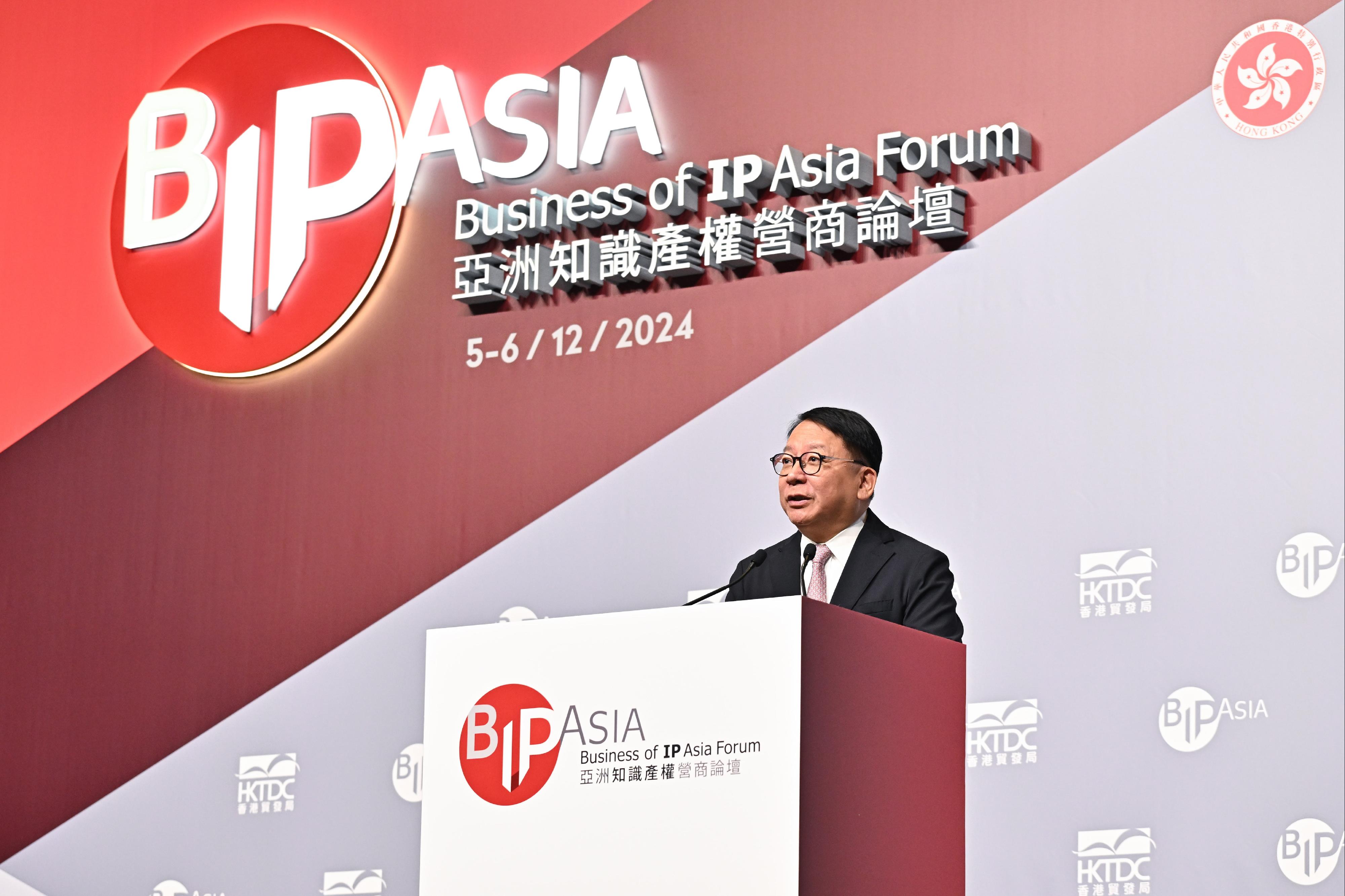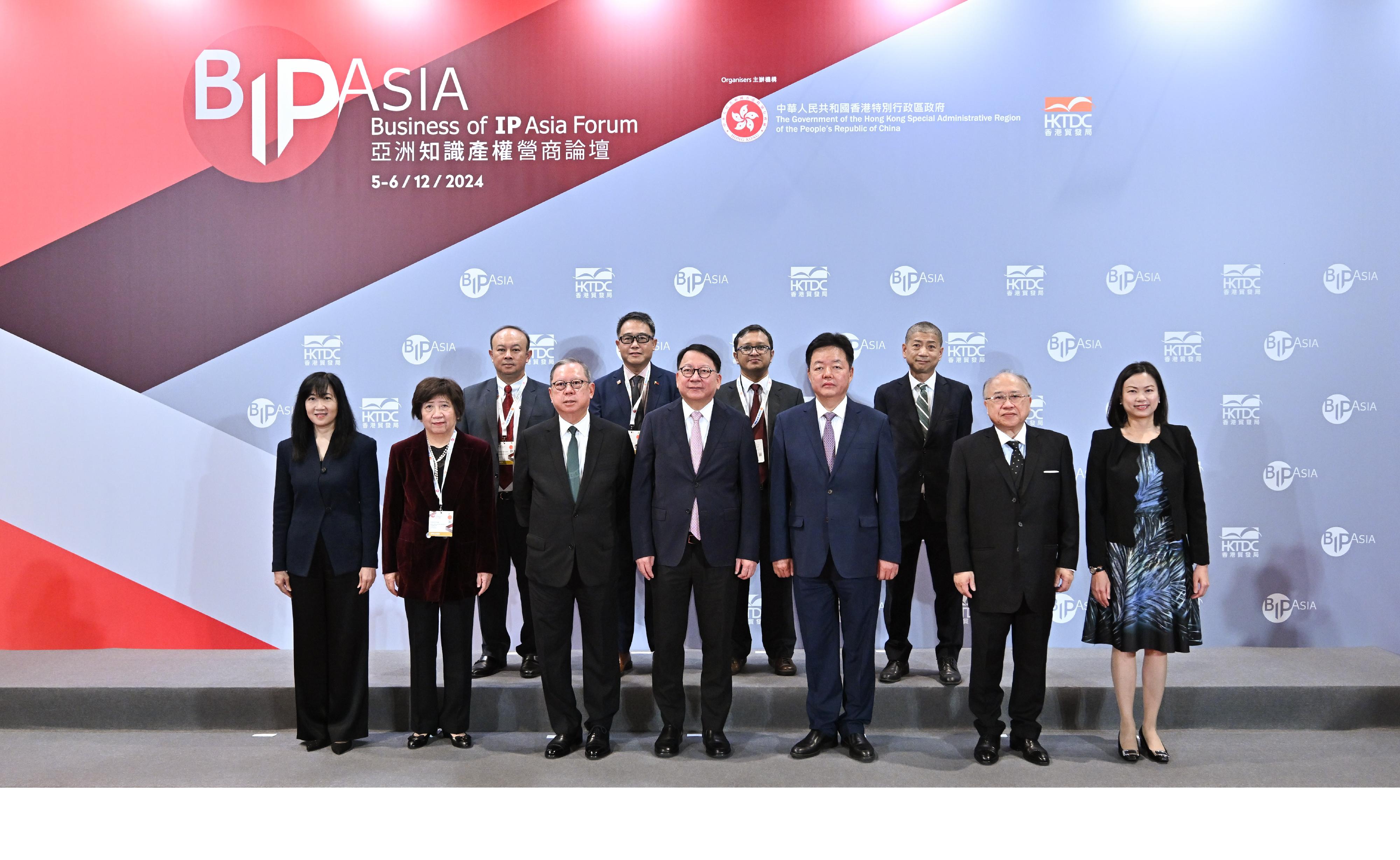Speech by CS at Business of Intellectual Property Asia Forum (English only) (with photos/video)
Following is the speech by the Chief Secretary for Administration, Mr Chan Kwok-ki, at the Business of Intellectual Property Asia Forum today (December 5):
Deputy Commissioner Hu Wenhui (Deputy Commissioner of the China National Intellectual Property Administration), Deputy Director-General Wang Binying (Deputy Director-General of the World Intellectual Property Organization), Dr Peter Lam (Chairman of the Hong Kong Trade Development Council), distinguished guests, ladies and gentlemen,
Good morning. Welcome to Hong Kong, and to the 14th edition of the Business of Intellectual Property (IP) Asia Forum.
This annual, two-day Forum is a global gathering. This year, about 2 000 IP owners, service providers and users from some 20 countries and regions are taking part. We are here to explore a crucial driver of our economic future: the development of intellectual property trading and its transformative potential, under the theme of "Reimagining IP for Impact and Growth."
With the support of our country through the National 14th Five-Year Plan, Hong Kong is committed to becoming a regional IP trading centre.
And we are on our way. To illustrate with an example: a Hong Kong-based start-up, specialising in electricity-free cooling technology, has attracted nearly $100 million Hong Kong Dollars in its Series A round financing, taking full advantage of Hong Kong's robust IP protection and extensive distribution networks.
Partnering with local and international companies, it is advancing new technology research and development (R&D), expanding its product portfolio and bringing its technology to the global market.
And it is only one of many Hong Kong success stories making use of their IP rights to generate growth.
I invite you to check out Radio Television Hong Kong's "IP: New Opportunities" programme for more inspiring Hong Kong stories. The success of these businesses is a testament to IP trading's power in driving economic growth and job creation.
The early stages of R&D require vigorous IP protection. And Hong Kong is committed to supporting our innovators. We are planning to establish a World Intellectual Property Organization Technology and Innovation Support Centre in Hong Kong, which is expected to commence operation by next year at the earliest. It will provide essential services to help our local entrepreneurs and businesses protect and commercialise their innovations.
Our goal is to make it easy for our entrepreneurs and businesses to go from product concept to market launch, offering expert guidance, support and resources.
And we are working to make it easy for you, too. Our "patent box" tax incentive, up and running since July, has reduced tax rates on qualifying IP profits from 16.5 per cent to 5 per cent. That can only encourage more R&D and IP trading.
Our strategy for ensuring Hong Kong's rise as a regional IP trading leader is built on two key pillars.
First, enhancing IP infrastructure. We will update the Copyright Ordinance and revamp the registered design regime to meet demand, today and tomorrow. Legislative amendments will also be proposed to streamline IP litigation, allowing our courts to manage such cases more effectively.
Second, we are building an IP-savvy workforce. Our Intellectual Property Department will work with the Qualifications Framework Secretariat to develop IP training materials for 23 industries. It will also advance our plans to introduce regulatory arrangements for local patent agents.
Hong Kong's IP strategy is evolving in a global context. As an international financial, trade and logistics centre, Hong Kong has long emphasised the importance of collaboration and knowledge sharing.
And we will continue to do so, engaging with the world, particularly our ASEAN neighbours and countries along the Belt and Road, in sharing best practices and staying at the forefront of IP trends.
Speaking of ASEAN, tomorrow's Forum features a two-part session on ASEAN IP commercialisation. Organised by the ASEAN Secretariat and our Intellectual Property Department, it is focused on the arts, cultural and creative industries. The Global Tech Summit is on tomorrow, as well, examining the transformative impact of AI and other technology.
And this afternoon, you will want to take in two highlight sessions on the Greater Bay Area and IP.
Remember, too, that the Business of IP Asia Forum is part of Innovation and IP Week, running through December 7 and featuring seven events covering IP, technology, design and branding.
My thanks to the Hong Kong Trade Development Council for bringing us together, once again, for this flagship event.
Ladies and gentlemen, I wish you all a rewarding Forum and the best of IP business in the coming year.
Thank you.





